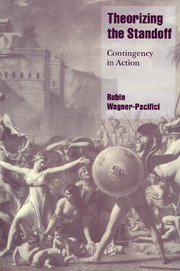1 - Theorizing contingency
Published online by Cambridge University Press: 22 September 2009
Summary
In every case the storyteller is a man who has counsel for his readers … After all, counsel is less an answer to a question than a proposal concerning the continuation of a story which is just unfolding. To seek this counsel one would first have to be able to tell the story.
(Walter Benjamin, “The Storyteller,” Illuminations, p. 86)God Himself probably preferred to speak of His world in the subjunctive of possibility … for God creates the world and thinks while He is at it that it could just as well be done differently.
(Robert Musil, The Man Without Qualities, p. 14)The grammarian's activity could not in itself be considered autonomous but must be seen as an aspect of an investigation conducted on two fronts, one of enunciation and one of observation. Grammar then presents itself as a theory of the event in its evolution.
(Ferdinand Gonseth, Time and Method, p. 106)Imagine that your life is like being on a train and looking out the window. Things fly past – houses, back yards, factories, forests, train stations, people on platforms, people in cars on the highway. Sometimes, though rarely, you catch the eye of a child playing in a yard or a motorist in a car. And then you are gone. What can you say about all of this stuff which is, for you, doubly in movement?
- Type
- Chapter
- Information
- Theorizing the StandoffContingency in Action, pp. 1 - 59Publisher: Cambridge University PressPrint publication year: 2000

